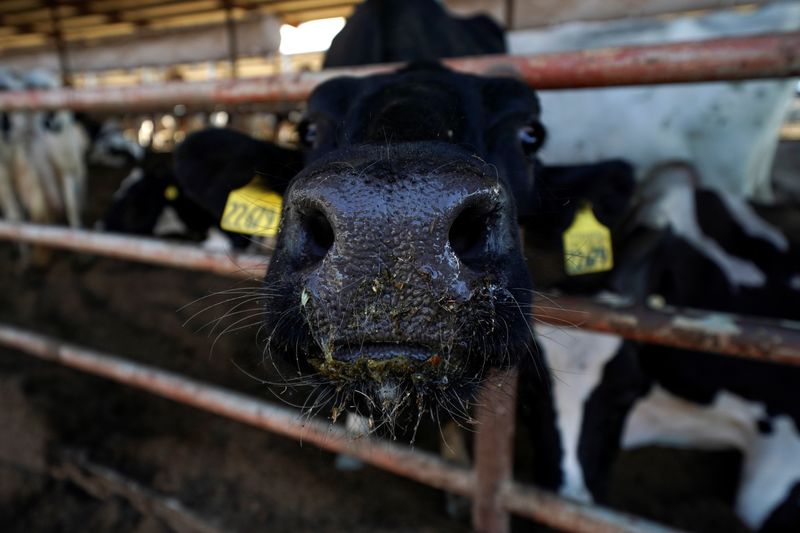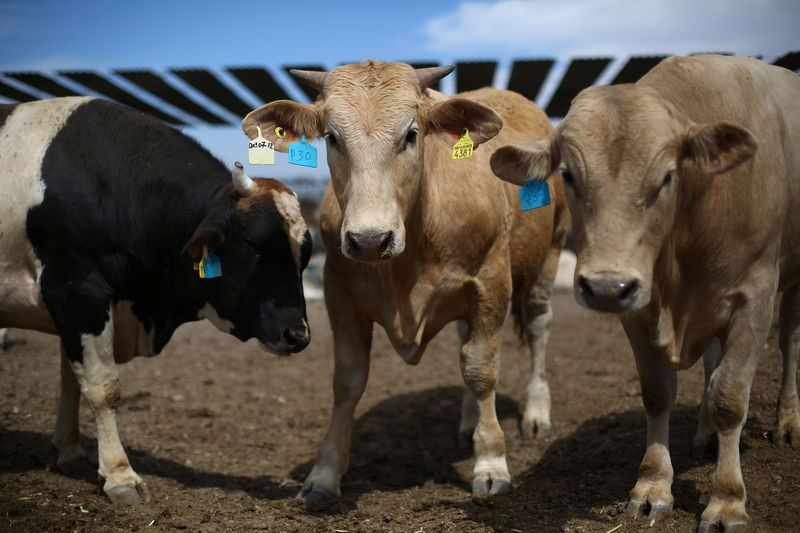By Tom Polansek, Julie Steenhuysen and Leah Douglas
CHICAGO/WASHINGTON (Reuters) -A second case of bird flu in humans has been confirmed in the United States since the virus was first detected in dairy cattle in late March, U.S. officials said on Wednesday.
The infection of a Michigan dairy worker adds to an outbreak of the virus that has been circulating among poultry for years, though the U.S. Centers for Disease Control and Prevention (CDC) says the risk to the general public remains low.
The CDC told reporters on a call that it has seen no evidence of human-to-human transmission of bird flu and that it has tested nearly 40 people since March, including the Michigan worker. All people tested were associated with or had exposure on a dairy farm, the CDC said.
In April, a Texas dairy worker was confirmed to be infected.
Michigan and Texas are among nine states that have reported bird flu in dairy herds. Scientists have said they believe the outbreak is more widespread, based on findings from the U.S. Food and Drug Administration (FDA) of H5N1 virus particles in about 20% of retail milk samples.
Similar to the Texas case, the Michigan patient reported only eye symptoms, the CDC said. The Michigan worker had mild symptoms and recovered, according to the state’s Department of Health and Human Services.
The worker was regularly exposed to livestock infected with bird flu, Michigan said. The leading hypothesis is that the case was the result of cow-to-human transmission, according to CDC.
The agency said “similar additional human cases may be identified” given the high concentrations of the virus in raw milk from infected cows and the extent of spread among dairy cows.
Influenza experts said the second case linked to exposure to dairy cattle was concerning.
“It is concerning that the virus is spreading widely among cows because it could lead to changes in the virus that could potentially increase human susceptibility,” said Scott Hensley, a flu vaccine expert at the University of Pennsylvania.
Bird flu has caused serious or fatal infections worldwide among people in close contact with infected wild birds or poultry, and scientists have long believed that the virus could cause a global health crisis.
“It does not appear to be the start of a pandemic, but we urgently need to assess whether additional human cases have occurred,” said Dr. Angela Rasmussen, a virologist at the University of Saskatchewan.
FINANCIAL SUPPORT FOR FARMERS, VACCINE TALKS
The U.S. Department of Agriculture (USDA) said it believes unpasteurized milk is the main vector for transmission of the virus among cows, although officials don’t know exactly how it spreads.
To limit transmission among livestock, the USDA in late April began requiring dairy cows to test negative before being transported across state lines.
The USDA will provide financial assistance to farmers whose flocks have not tested positive for bird flu to develop and implement biosecurity and testing measures, according to senior advisor Eric Deeble.
The agency will also retroactively compensate farmers for lost milk due to infected herds, Deeble said.
“It is likely that there will be several cases arising from exposure to infected cows and their milk among farm workers,” says Dr. Amesh Adalja, an infectious disease expert at the Johns Hopkins Center for Health Security.
“The most important thing is to make sure the tests are broad enough to capture them.”
Nirav Shah, CDC’s principal deputy director, said the agency received the patient sample from Michigan on Tuesday and confirmed the positive test result that evening. Investigators are looking into whether the employee wore or was provided with protective equipment.
A nasal swab from the employee tested negative for influenza in the state, but an eye swab was sent to CDC and tested positive for the bird flu virus, the agency said.
The CDC said it recommended isolation, not quarantine, for close contacts of the person who tested positive for bird flu. It added that close contacts of exposed workers will be offered antiviral medications.

The US is in ‘active discussions’ with makers of mRNA vaccines Pfizer (NYSE:) and Modern (NASDAQ:) about a possible vaccine for humans, a U.S. Department of Health and Human Services (HHS) official said.
Last week, the U.S. government began the process of manufacturing approximately 4.8 million doses of vaccine corresponding to the currently circulating H5N1 strain, a move that Dawn O’Connell, assistant secretary for preparedness and response at HHS, said “will strengthen our preparedness position further strengthened.”





















